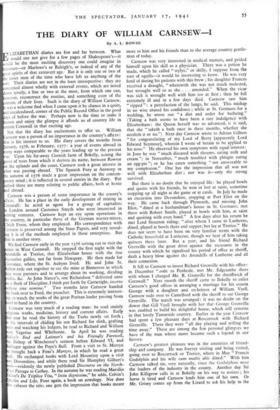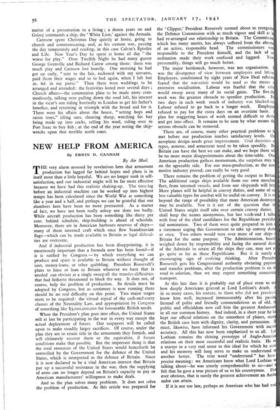THE DIARY OF WILLIAM CARNSEW I
By A. L. ROWSE LIZABETHAN diaries are few and far between. What would one not give for a few pages of Shakespeare's—it ould be the most exciting discovery one could imagine in .'
'ter ture—or Marlowe's or Raleigh's, or indeed of any of the :real spirits of that extravert age. But it is only one or two of e lesser men of the time who have left us anything of the ort. Their diaries are not in the least introspective : they are oncerned almost wholly with external events, which are noted own tersely, a line or two at the most, from which one can, owever, reconstruct the routine, and something even of the s oncerned almost wholly with external events, which are noted own tersely, a line or two at the most, from which one can, owever, reconstruct the routine, and something even of the s ontent, of their lives. Such is the diary of William Camsew. tw s a welcome find when I came upon it by chance in a quiet, nd urcalendared, corner of the Public Record Office in the good ays of before the war. Perhaps now is the time to make it no n and enjoy the glimpse it affords us of country life in emote Cornwall in that exciting age.
Not that the diary has excitements to offer us. William rnsew was a person of no importance in the country's affairs : at is his interest to us. His diary covers the months from anuary, 1576, to February, 1577: a year of events abroad in any ways comparable to the years leading up to the present ,ar. Upon his far-away Cornish farm of Bokelly, among the _rove of trees from which it derives its name, between Rowtor n e uplands and the coast, Carnsew took a great interest in hat was passing abroad. The Spanish Fury at Antwerp in e autumn of 1576 made a great impression on the contem- orary mind ; it is reflected in several entries in the diary. But deed there are many relating to public affairs, both at home nd abroad.
Carnsew was a person of some importance in the county's `fairs. He has a place in the early development of mining in oilman: he acted as agent for a group of capitalists London around Customer Smyth who were interested in ining ventures. Camsew kept an eye upon operations in e country, in particular those of the German master-miner, lrich Frose, whom they employed. His correspondence with arnsew is preserved among the State Papers, and very reveal- , g it is of the methods employed in those enterprises. But at is another story.
We find Carnsew early in the year 1576 setting out to visit the sines in West Cornwall. He stopped the first night with the rundells at Trerice, that Elizabethan house with the fine eco ative gables, not far from Newquay. He then made for lowance, where the St. Aubyns lived. He and John St. ub n rode out together to see the mine at Binnerton in which ey were partners and to arrange about its working, dividing rofi s, &c. At John Nance's, one Richardson " delivered unto e a Book of Discipline, I think put forth by Cartwright, incerto qthore sine nomine." . Two months later Camsew handed e book over to Ford, the preacher. This is extremely interest- g, to watch the works of the great Puritan leader passing from and to hand in the country.
Carnsew was very much of a reading man: he read mainly ligious works, medicine, history and current affairs. Early at year he read the history of the Turks newly set forth ; the intervals of chiding his son Richard for sloth, grafting ees and watching 'his ledgers, he read to Richard and William om Vegetius and Whithorne. In April he was reading ' idl 's End and Latimer's and his Friendly Farewell, e Bishop of Winchester's sermon before Edward VI, and ulli ger against the Pope's Bull. From a visit to St. Merryn e brought back a Foxe's Martyrs, in which he read a great eal. He exchanged books with Lord Mountjoy upon a visit 1 to Devonshire, and while there read Sir Humpbry Gilbert's ,00k--evidently the newly published Discourse on the North- lest Passage to Cathay. In the autumn he was reading Marsilio icino's De Triplice Vita, lectu dignissine," he adds, Colvin's pistles and Life, Foxe again, a book on astrology. Nor does at exhaust the tale; one gets the impression that books meant more to him and his friends than to the average country gentle- man of today.
Carnsew was very interested in medical matters, and prided himself upon his skill as a physician. There was a potion he made, which he called " stylye," or sldlly, I suppose from the root of squills—it would be interesting to know. He was very fond of dosing his patients with this brew ; his daughter Frances received a draught, " wherewith she was not much molested, but wrought well so as she . . . amended." When the vicar was sick it wrought well with him too at first ; then he fell extremely ill and in a few days died. Carnsew saw him " ripped ": a putrefaction of the lungs, he said. This mishap in no wise abated his confidence ; while at St. Germans for a wedding, he wrote out " a diet and order for batheing." (Taking a bath seems to have been a rare indulgence with Elizabethans : the Queen herself was so advanced, it is said, that she " taketh a bath once in three months, whether she needeth it or no.") Next day Carnsew wrote to Adrian Gilbert " for congratulating of my Lord of Berry [apparently Lord Edward Seymour], wherein I wrote of betain to be applied to his nose." He observed his own symptoms with equal interest: in June he was " much diseased with rheums, eating milk and cream "; in November, " much troubled with phlegm eating an egg-pie "; or he has eaten something " not answerable to my complexion." One has the impression that all was not well with Elizabethan diet ; nor was it—only the strong survived.
But there is no doubt that he enjoyed life: he played bowls and quoits with his friends, he won or lost at saint, sometime stopping up all night at the game or at cards. In July he made an excursion into Devonshire, ;topping at Port Eliot on the way. He came back through Plymouth, and missing John Eliot, "dined at a husbandman's house in St. Germans; met there with Robert Smith, played at bowls with him, at saint and quoiting with even hand." A few days after his return he met Lord Stourton riding; " after whom I came to Lanherne, dined, played at bowls there and supper; but lay at Trerice." He does not seem to have been on very familiar terms with the Catholic household at Lanherne, though we hear of him taking quinces there later. But a year, and his friend Richard Grenville with the great drive against the recusants in the county with which he signalised his period of office as sheriff, dealt a heavy blow against the Arundells of Lanheme and all their connexion.
It fell to Carnsew to invest Richard Grenville with his office: in December " rode to Penheale, met Mr. Edgcumbe there with whom I charged Mr. R. Grenville for the sheriffwick of Cornwall." Next month the sheriff came to Bokelly to enlist Camsew's good offices in arranging a marriage for his cousin George with a daughter and co-heiress of William Vyell. Carnsew rode over to Camelford with the sheriff to see George Grenville. The match was arranged : it was no doubt on the dower that Gill Vyell brought with her that George Grenville was enabled to build his delightful house, which still remains in that lovely Tamarside country. Earlier in the year Carnsew had spent a few pleasant days at Roscarrock with Richard Grenville. There they were " all day playing and trifling the time away." These are among the few personal glimpses we have of the man whose name became such a legend in our history.
Carnsew's greatest pleasure was in the amenities of friend- ship and company. He was forever visiting and being visited, going over to Roscarrock or Trerice, where in May " Francis Godolphin and his wife cum multis aliis dined." With him Carnsew talked tin, very naturally, since the Godolphins were the leaders of the industry in the county. Another day Sir John Killigrew calls in at Bokelly on his way to assizes ; his horse is tired and Camsew lends him one of his own. Or Mr. Grisey comes up from the Lizard to ask his help in the matter of a presentation to a living ; a dozen years on and Grisey commands a ship, the ' White Lion,' against the Armada.
Carnsew spent Christmas Day quietly at home, going to church and communicating, and, as his custom was, passing the day temperately and reading, in this case Calvin's Epistles and Life. New Year's Day he spent at home all day " the worse for play." Over Twelfth Night he had many guests George Grenville and Richard Carew among them: there was much play and Carnsew lost heavily. One morning he had got up early, " sent to the fair, reckoned with my servants, paid them their wages and so to bed again, when I left but 2s. 6d. in my purse." Then there were weddings to be arranged and attended: the festivities lasted over several days ; Church affairs—the communion plate to be made more com- modiously, talking over pulling down the rood loft, his interest in the vicar's son riding hurriedly to London to get his father's benefice, and returning in triumph with the broad seal for it. There were his affairs about the house, " setting hops and raisin trees," tilling oats, shearing sheep, watching his hay being made up into cocks, selling his wool, riding over to Port Isaac to buy fish ; at the end of the year noting the ship- wrecks upon that terrible north coast.































 Previous page
Previous page